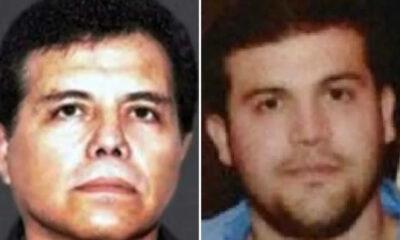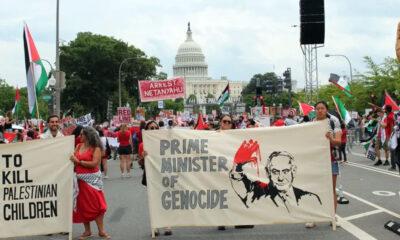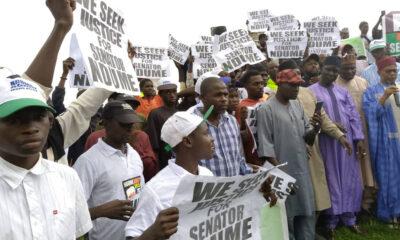International
In Texas, pro-Palestine university protesters clash with state leaders
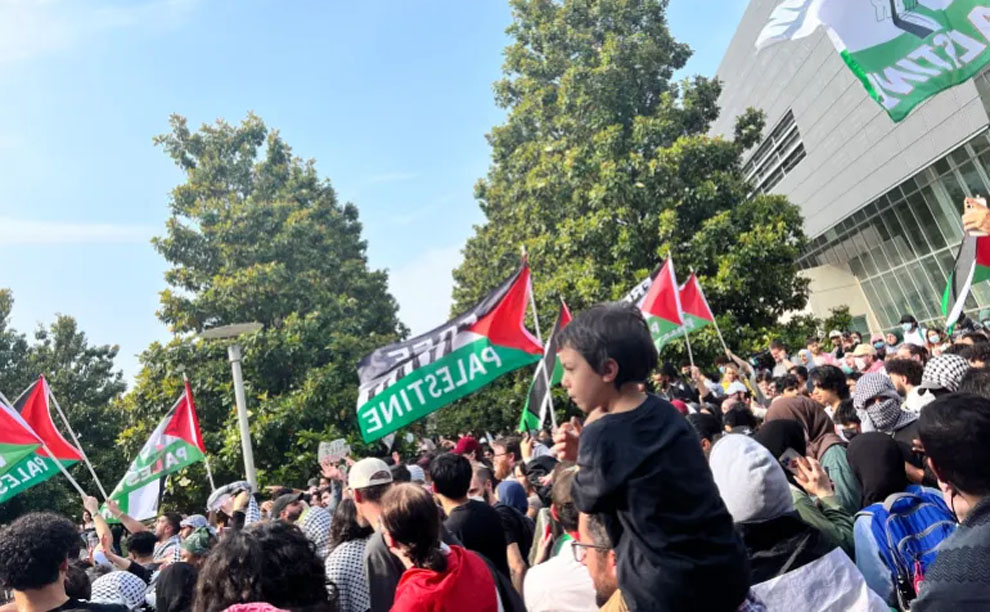
In Texas, pro-Palestine university protesters clash with state leaders
Austin, Texas – “It didn’t feel real.” That’s how Alishba Javaid, a student at the University of Texas at Austin, describes the moment when she saw roughly 30 state troopers walk onto the campus lawn.
Javaid and hundreds of her classmates had gathered on the grass, in the shadow of the campus’s 94-metre limestone tower, as part of a walkout against Israel’s war in Gaza.
They were hoping that their school would divest from manufacturers supplying weapons to Israel. Instead, law enforcement started to appear in increasing numbers.
By Javaid’s count, the state troopers joined at least 50 fellow officers already in place, all dressed in riot gear. The protest had been peaceful, but nerves were at a high. The troopers continued their advance.
“That was the first moment I was genuinely scared,” said Javaid, 22.
Dozens of students were ultimately arrested on April 24, as the officers attempted to disperse the protesters. Footage of the clashes between police and demonstrators quickly spread online, echoing images from other campus protests across the United States.
Yet, Texans face a unique challenge, as they contend with a far-right state government that has sought to limit protests against Israel.
READ ALSO:
- Palestinian doctor dies in Israeli prison
- Ganduje shares cash to 400 PWDs
- Police arrest four ex-convicts for robbery in Niger
In 2017, Governor Greg Abbott signed a law that prohibits government entities from working with businesses that boycott Israel, and the state has since taken steps to tighten that law further.
Abbott has also cast the current protests as “hate-filled” and “anti-Semitic”, amplifying misconceptions about demonstrators and their goals.
In addition, a state law went into effect earlier this year that forced public universities to shutter their diversity, equity and inclusion (DEI) offices.
Multiple students and employees told Al Jazeera that campuses have become less safe for people of colour as a result of the law, which forced the departure of staff DEI advocates.
‘Using violence to subvert minorities’
The violence has continued at University of Texas campuses as students press forward with their protests.
On the final day of class, April 29, police used pepper spray and flash-bang devices to clear a crowd at the Austin campus, while dozens more were encircled by troopers and dragged away screaming.
Hiba Faruqi, a 21-year-old student, said her knee “just kept bleeding” after she was knocked over during a pushing-and-shoving match between students and police.
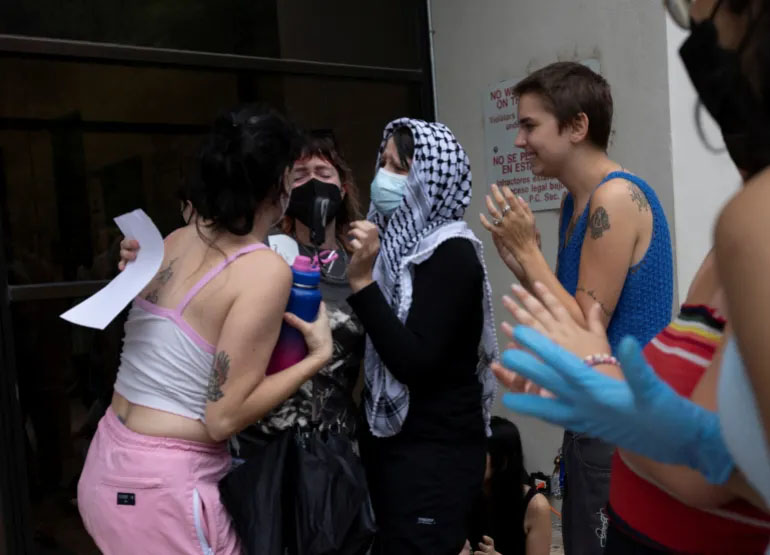
Student protesters applaud one another as they are released from the Travis County Jail in Austin, Texas, on April 30 [Nuri Vallbona/Reuters]
Yet she counts herself lucky for not sustaining worse injuries. It was surreal, she said, to think that her own university called in state troopers — and then had to deploy medical personnel to assist students who were hurt.
“There’s a racist element people don’t want to talk about here,” she said. “There’s a xenophobic element people don’t want to acknowledge. There are more brown protesters, which maybe emboldens the police to do things a certain way.”
As calls for divestment continue, students, lawyers and advocates told Al Jazeera they have been forced to navigate scepticism and outright hostility from the Texas government.
READ ALSO:
- US congressman, wife charged with $600,000 bribe tied to Azerbaijan, Mexican bank
- Don’t host US, French military bases in Nigeria, northern leaders warn Tinubu
- Osun kingship Tussle: Court stops coronation of Gov Adeleke-appointed king
“Texas is known for using violence to subvert minorities,” Faruqi said. “The reason this is shaking people this time is because it’s not working.”
Scrutiny over university endowments
Many of the protests have zeroed in on the University of Texas’s endowment, a bank of funds designed to support its nine campuses over the long term.
The University of Texas system has the largest public education endowment in the country, worth more than $40bn.
Some of that money comes from investments in weapons and defence contractors, as well as aerospace, energy and defence technology companies with deep ties to Israel.
ExxonMobil, for example, is one of the biggest beneficiaries of the system’s investments, and the company has supplied Israel with fuel for its fighter jets.
Those ties have fuelled the protests across the state’s public university campuses, including a May 1 demonstration at the University of Texas at Dallas.
Fatima — who only shared her first name with Al Jazeera, out of fear for her safety — was among the demonstrators. She wiped sweat from her brow as a young child led the crowd of about 100 in a series of chants: “Free, free, free Palestine!”
The divestment protests have largely been peaceful, Fatima explained, raising her voice to be heard above the noise.
“Over 30,000 people have been murdered,” she said, referring to the death toll in Gaza, where Israel’s military campaign is entering its eighth month.
“And our university is investing in weapons manufacturing companies that are providing Israel with these weapons. We’re going to stay here until our demands are met.”
Twenty-one students and staff members were arrested that day in Dallas. Members of the group Students for Justice in Palestine, of which Fatima is a member, spent the night outside the county jail, waiting for their friends to be released.

One protester wryly noted outside the jail that they had been arrested for trespassing on their own campus, a seemingly nonsensical offence.
READ ALSO:
- We have added 625MW to national grid – Minister
- Minimum wage, maximum deceit and moral cowardice – Farooq Kperogi
- EFCC nabs 20 suspected internet fraudsters in Sapele
- Nigerian pastor under fire over porn-addiction remedy
In the background, a thunderstorm was beginning to rear its head, so the protesters huddled closer together under the awning.
Protesters receive community support
Texas officials and university administrators have justified the police crackdowns, in part, by citing the presence of outsiders with no present affiliation with the campuses involved.
But 30-year-old activist Anissa Jaqaman is among those visiting the university protests, in an effort to lend supplies and support.
Everyone has a role to play, Jaqaman explained: Her role is sometimes that of the communicator, but more often that of the healer.
She has brought water to the student demonstrators at the University of Texas at Dallas and hopes to provide a space for people to “come over and talk about how we heal”.
“This is a healing movement,” she said time and again as she spoke to Al Jazeera. “We have to carry each other.”
Jaqaman is Texas through and through: She was raised in the Dallas suburbs and is a strong advocate for her state.
“I’m a proud Texan,” she said. “I actually think that Texans are some of the nicest people in the country.”
But back when she was in college, from 2012 to 2016, Jaqaman started to use her voice to bring awareness to the plight of Palestinians.
Rights groups have long warned that Israel has imposed a system of apartheid against the ethnic group, subjecting its members to discrimination and displacement.
In college, Jaqaman’s friends often laughed at her passion. She often smiles, exuding optimism, but her voice grows serious as she talks about Palestine, as well as other issues like the scourge of single-use plastics.
“They just thought I was a tree-hugger, but for human rights,” she explained, speaking in a soft yet confident voice.
But the current war has amplified her concerns. The United Nations has signalled famine is “imminent” in parts of Gaza, and rights experts have pointed to a “risk of genocide” in the Palestinian enclave.
Jaqaman has sported her keffiyeh scarf ever since the war began on October 7, despite feeling anxious that it could attract violence against her.
“I wear it because I feel like it protects my heart, honestly,” she said. “I feel like I’m doing the Palestinian people injustice by not wearing it.”
But she has struggled to get public officials to engage with her concerns about the war and divestment from industries tied to Israel’s military. For months, she attempted to persuade her local city council that “this is a human issue, an everyone issue”, to little avail.
“Everything that we’re seeing right now is about shutting down the discussion,” she said. “If you say anything about Palestine, you’re labelled anti-Semitic. That’s a conversation-ender.”
Youth protesters look to the future
Students like Javaid, a journalism major in her final semester, told Al Jazeera that they are still trying to figure out what healing looks like — and what their futures might hold. In many ways, she and her friends feel stuck.
They recognise they need to take a break from scouring social media for information about the war, and yet it is all they can think about.
The usual college rites of passage — final exams, graduation and job hunting — just don’t seem as important any more.
“How are we supposed to go back to work now?” Javaid asked after the protests.
While she has treasured her time at the university, she is also highly critical of its actions to stamp out the protests. Part of the blame, she added, lies with the government, though.
“The root issue in Texas is that the state government doesn’t care,” she said.
Born and raised in the Dallas area, Javaid plans to stay in Texas for at least a little while after she graduates this month. She has mixed feelings about staying long term, though.
She would like to work in social justice, particularly in higher education, but she worries such a job would be tenuous in her home state.
Still, she feels a sense of responsibility tying her to the state. The political climate in Texas may be challenging, she said, but she has a duty — to her fellow protesters and to Palestine — to keep playing a role.
“I don’t want to jump ship and just say, ‘Texas is crazy’,” Javaid said. “I want to be a part of the people trying to make it better. Because if not us, who?”
In Texas, pro-Palestine university protesters clash with state leaders
SOURCE: AL JAZEERA
International
Netanyahu, Biden hold talks over tense Gaza ceasefire
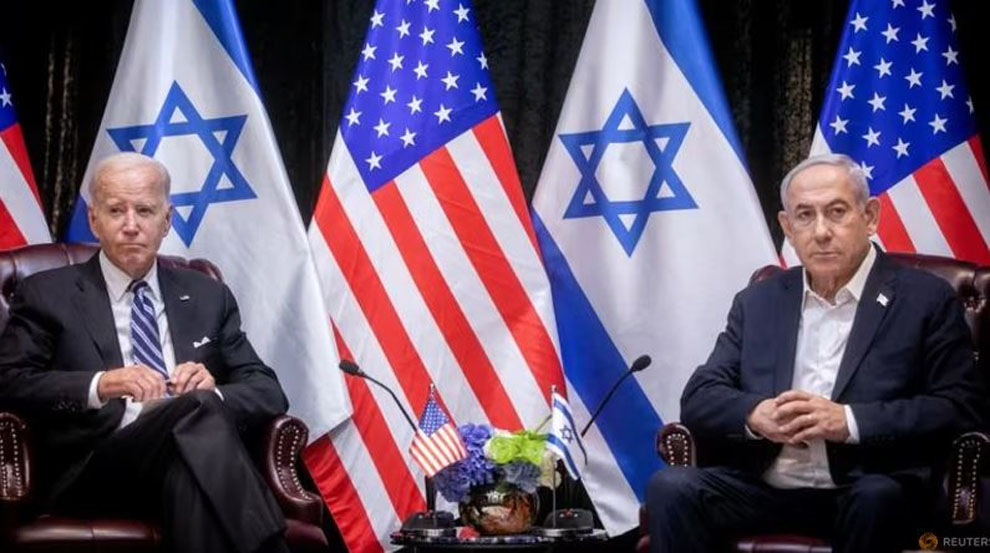
Netanyahu, Biden hold talks over tense Gaza ceasefire
WASHINGTON DC: Israeli Prime Minister Benjamin Netanyahu said Thursday he was ready to work with Joe Biden for the rest of his presidency, as the two leaders met for the first time at the White House for talks on a Gaza ceasefire.
“I want to thank you for the 50 years of public service and 50 years of support for the state of Israel,” Netanyahu said after they shook hands in the historic setting of the Oval Office.
“And I look forward to discussing with you today and working with you in the months ahead.”
Biden stunned the world Sunday when he announced that he was bowing out of the US presidential election, with Vice President Kamala Harris now set to be the Democratic Party’s candidate.
Netanyahu will also meet Harris separately at the White House, in a reflection of the new political reality that will see Biden as a lame duck president for his remaining six months in office.
The Harris meeting comes amid speculation that if she wins in November it could herald a tougher approach on Israel’s war in Gaza.
Relations between Biden and Netanyahu are tense over Israel’s conduct in the war sparked by Hamas’s Oct. 7 attacks, but the US president has continued strong military and political support.
They have met just three times during his presidency, once in September last year in New York, and then when Biden traveled to Israel after the attacks and hugged Netanyahu on the airport tarmac at Tel Aviv.
The meetings come after Netanyahu vowed “total victory” against Hamas in a fiery speech Wednesday to the US Congress.
Biden and Netanyahu will later meet the families of US hostages held in Gaza.
The White House was surrounded by metal barriers and a heavy police presence, after rowdy protests broke out near the Capitol following Netanyahu’s speech.
Harris on Thursday condemned the “despicable” and “unpatriotic” burning of an American flag by protesters, after attempts by Donald Trump’s Republicans to paint Democrats as pro-Hamas.
READ ALSO:
- Islamic scholars warn parents, schools against skipping Primary 6
- It’s time to end war in Gaza, US VP Harris tells Netanyahu
- Nigerian who stabbed army officer in UK lands in court
In a primetime speech explaining his decision on Sunday to bow out of the US presidential election, Biden made clear that resolving the conflict would remain a top priority.
“I’m going to keep working to end the war on Gaza, bring home all the hostages to bring peace and security to the Middle East and end this war,” the US president said.
A senior US administration official said Wednesday that negotiations on a Gaza deal were in the “closing stages” and that Biden would try to close some “final gaps” with Netanyahu.
Harris has previously been more outspoken about Israel’s conduct of the war, prompting speculation she will shift her policy as presidential nominee.
The US official said there was “no daylight between the president and vice president,” who will meet Netanyahu at 4:30 p.m. (2030 GMT).
Netanyahu will meet Republican contender Donald Trump on Friday at his Mar-a-Lago residence in Florida.
The ex-president on Thursday morning urged Israel to quickly “finish up” its war in Gaza, warning its global image was being tarnished.
Biden has offered Israel steadfast support since October 7.
But the US president has been increasingly critical of Israel over the Palestinian death toll in its offensive in Gaza, and criticized restrictions on the amount of aid getting through to the territory, much of which has been reduced to rubble.
The Hamas attack on October 7 resulted in the deaths of 1,197 people in Israel, most of them civilians, according to an AFP tally based on official Israeli figures. Out of 251 people taken hostage that day, 111 are still being held inside the Gaza Strip, including 39 who the military says are dead.
More than 39,100 Palestinians have been killed in Israel’s military campaign in the Gaza Strip since the war began, according to data provided by the health ministry of Hamas-run Gaza, which does not give details of civilian and militant deaths.
According to the Israeli military 327 soldiers have been killed in the Gaza military campaign since the start of the ground offensive on October 27.
Netanyahu, Biden hold talks over tense Gaza ceasefire
ARAB NEWS
International
It’s time to end war in Gaza, US VP Harris tells Netanyahu

It’s time to end war in Gaza, US VP Harris tells Netanyahu
US Vice-President Kamala Harris – who’s expected to be the Democratic nominee for November’s presidential election – has held what she called “frank and constructive” talks with Israeli Prime Minister Benjamin Netanyahu.
Striking a tougher tone than President Joe Biden, Ms Harris said she made clear her “serious concerns” about casualties in Gaza, telling Mr Netanyahu how Israel defended itself mattered.
“It is time for this war to end,” she said after their face-to-face talks at the White House.
Ms Harris also stressed the need for a path to a two-state solution, while calling on Americans to be aware of “nuance” on the conflict.
Earlier on Thursday, Mr Netanyahu met Mr Biden, who stepped down from his re-election campaign on Sunday.
Mr Netanyahu’s meetings at the White House came a day after he gave a fiery speech to Congress, vowing “total victory” against Hamas, as thousands of pro-Palestinian protesters demonstrated outside.
The prime minister faces pressure both at home and abroad to bring an end to the Israel-Gaza war, now in its ninth month.
Mr Biden’s staunch support of Israel has infuriated many left-wing activists, whose support the Democrats may need if they are to win November’s presidential election.
Given that, there is also considerable interest in the position Ms Harris might take towards Israel should she replace Mr Biden in the White House.
After meeting Mr Netanyahu for about 40 minutes, Ms Harris said she had an “unwavering commitment” to Israel and its right to defend itself.
She noted the conflict began on 7 October when Hamas militants attacked southern Israel from Gaza, killing 1,200 people and taking more than 250 captives, according to Israeli tallies.
READ ALSO:
- Nigerian who stabbed army officer in UK lands in court
- Abducted Edo pastor regains freedom, police kill kidnapper
- Leader of Mexico’s Sinaloa drug cartel arrested in Texas
Israel’s retaliatory offensive in Gaza has killed more than 39,000 people.
“Israel has a right to defend itself. And how it does so matters,” Ms Harris said, expressing concern about the “dire humanitarian situation” in Gaza.
“We cannot allow ourselves to be numb to the suffering and I will not be silent,” she said.
“Let’s get the deal done so we can get a ceasefire to end the war,” she added. “Let’s bring the hostages home, and let’s bring much-needed relief to the Palestinian people.”
Mr Netanyahu is due to meet Republican presidential nominee Donald Trump on Friday.
International
Nigerian who stabbed army officer in UK lands in court
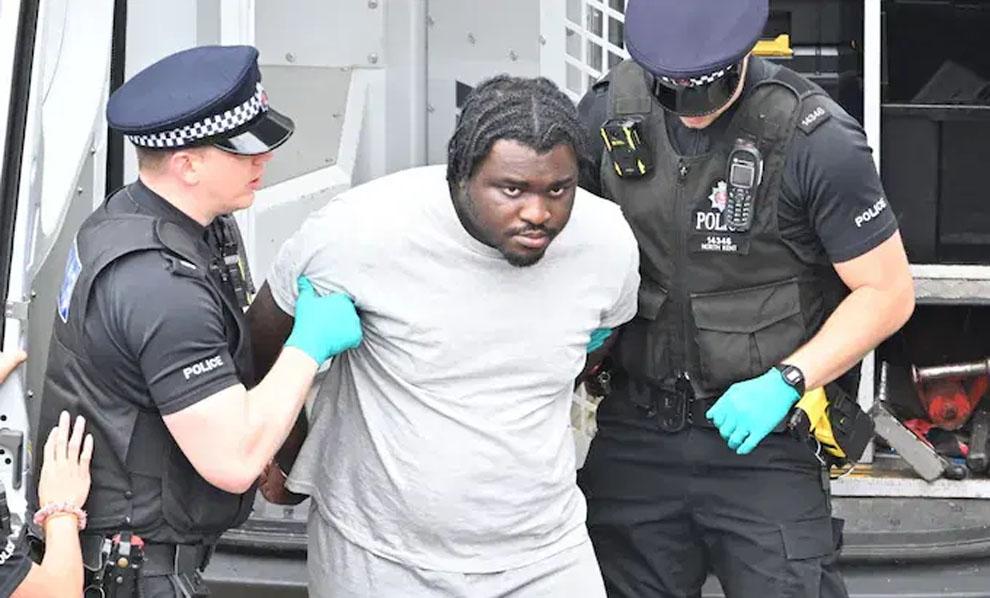
Nigerian who stabbed army officer in UK lands in court
A Nigerian has been charged after an army officer was stabbed near a barracks in Gillingham in Kent.
Anthony Esan, 24, was arrested after the attack on Lieutenant Colonel Mark Teeton at around 5.55pm on Tuesday which took place in Sally Port Gardens, near Brompton Barracks, headquarters of the 1 Royal School of Military Engineering Regiment.
He has been charged with attempted murder and possession of an offensive weapon in a public place. Esan was pictured arriving at Medway Magistrates’ Court yesterday.
READ ALSO:
- Abducted Edo pastor regains freedom, police kill kidnapper
- Leader of Mexico’s Sinaloa drug cartel arrested in Texas
- Israeli forces advance in southern Gaza, tanks in Rafah
Police said a man was reported to have left the scene on a motorcycle after the stabbing. The arrest took place on Mooring Road in Rochester at around 6.30pm.
Kent Police said the victim – in his 40s – is in a serious but stable condition after being airlifted to hospital.
Nigerian who stabbed army officer in UK lands in court
-

 News2 days ago
News2 days agoNLC can’t withdraw from protest it didn’t organise – Ajaero
-

 News3 days ago
News3 days agoNorthern group attacks Reps Minority Caucus for demanding Nnamdi Kanu release
-

 News3 days ago
News3 days agoMinimum wage: Akpabio says domestic workers can’t earn less than N70,000
-

 News2 days ago
News2 days agoFG unveils training programme for 1,000 Nigerians in AI, blockchain
-
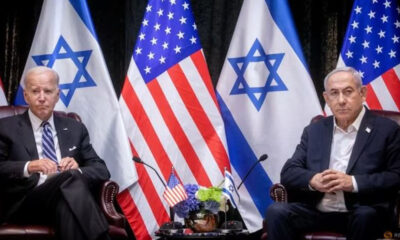
 International17 hours ago
International17 hours agoNetanyahu, Biden hold talks over tense Gaza ceasefire
-
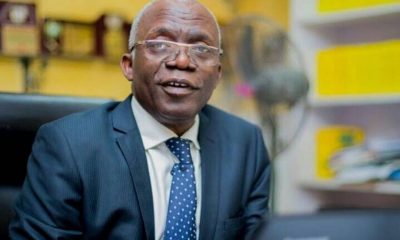
 News3 days ago
News3 days agoFalana to FG: Threatening Nigerians won’t stop mass protest
-

 metro1 day ago
metro1 day agoNERDC Executive Secretary Prof Ismail Junaidu slumps, dies
-

 metro2 days ago
metro2 days agoPastor remanded for allegedly defiling teenager, attempting abortion

